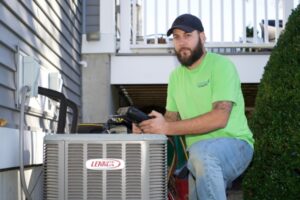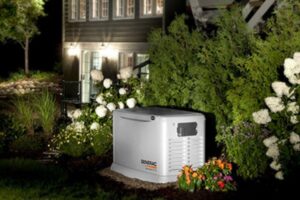Decoding HVAC: Understanding The AC Condenser Vs. Evaporator Coil
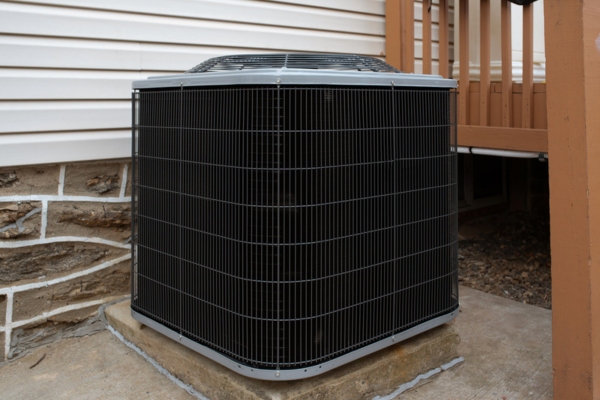
Contents
- 1 Differentiating A/C Condenser vs Evaporator Coil
- 2 Conclusion
- 3 Contact Columbus Energies for Comprehensive HVAC Solutions
Air conditioning units improve the indoor environment not by producing cool air but by employing the method of heat removal—shifting the warm air from the interior to the exterior. This cooling method is accomplished thanks to the collaborative effort of two essential parts: the condenser vs evaporator coil. Although they look alike, these coils serve unique functions within the air conditioning mechanism, operating in tandem but through contrary methods to effectively reduce indoor warmth.
The article by Columbus Energies tackles the distinctions between condenser vs evaporator coils, providing a deeper understanding of their distinct roles and how they enhance the air conditioning unit’s performance.
Differentiating A/C Condenser vs Evaporator Coil

Central air conditioning units consist of an interior and an exterior component linked by pipes that transport refrigerant. This refrigerant is crucial for the cooling mechanism due to its capacity to soak up substantial heat and transition between gas and liquid states in response to variations in pressure. When activated, the refrigerant moves between these components, enabling the movement of heat. The essential function of the condenser and evaporator coils in this mechanism is to oversee the refrigerant’s transformations to expel heat effectively.
The Evaporator Coil of the AC System
Located within the indoor component, the evaporator coil is made up of copper tubing that transports the exceptionally cold refrigerant. When the system’s fan pulls warm air from the room over the coil, the refrigerant captures the heat from the air. At the same time, the air’s moisture condenses upon the chilly coils, diminishing the humidity levels. This action produces cooler and less moist air, which is then pushed back into the space by the fan, increasing the comfort level for those inside.
Once the refrigerant exits the evaporator coil, now a bit warmer than when it arrived, it travels via an insulated line to the exterior unit, encased in a sizable cabinet that contains the compressor and condenser coils. As it reaches the compressor, the refrigerant undergoes compression, which elevates its temperature even more. This intensified heat condition improves the process of shifting heat from the refrigerant to the air outside, aiding the air conditioning operation.
The Condenser Coil in the Air Conditioning Unit
Similar in design and material to the evaporator coil, the condenser coil plays an opposing role in the air conditioning cycle. While the evaporator coil takes in heat, the condenser coil discharges that heat outdoors. This heat absorption and release process repeats until the desired temperature set on the thermostat is achieved. Throughout this operation, the gentle buzzing of the compressor and the fans typically signals that the system is actively working.
The hot refrigerant vapor cools and transitions back into a liquid state as it expels heat into the surroundings. A fan in the outdoor unit assists this process by directing air through the condenser coil, which enhances heat release. Once transformed back into liquid, the refrigerant is ready to cycle back to the evaporator coil within the indoor unit. It flows through an expansion valve, which causes it to vaporize and cool further, preparing it to absorb additional heat in the next cycle.
Enhancing AC Efficiency with Coil Compatibility
Ensure that A/C condensers and evaporator coils are compatible to maximize your air conditioning system’s efficiency and durability. Using mismatched components can decrease efficiency, increase operational costs, and increase the risk of system breakdowns. When replacing or upgrading components, it’s crucial to select coils and condensers that match in size, capacity, and refrigerant type to enhance heat transfer and system performance.
Manufacturers usually suggest specific combinations that are proven to work well together. Consulting with HVAC experts or following manufacturer recommendations can help ensure your system runs efficiently, improving comfort and saving energy.
Maximize your air conditioning system’s efficiency and lifespan by ensuring compatibility between A/C condensers and evaporator coils. Call Columbus Energies today!
Air Conditioning Coil Maintenance
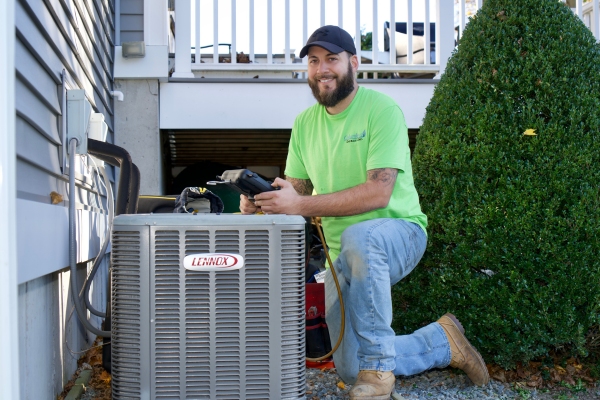
Keeping your air conditioning system efficient involves routine evaporator and condenser coils maintenance. Avoiding common problems doesn’t demand significant work, just a yearly service by a professional HVAC contractor. In this maintenance session, the technician will focus on the coils and check additional parts to guarantee the whole system operates smoothly. They will conduct a comprehensive evaluation based on a standard maintenance checklist for air conditioning systems to enhance energy efficiency and prolong the system’s operational life.
Experience unparalleled HVAC services tailored to your needs and budget – reach out to Columbus Energies for a free in-home consultation and let us enhance your comfort. Call now!
Issues with Air Conditioner Coils
The operation of an air conditioner heavily relies on its coils, which can face several problems, including:
Coil Corrosion
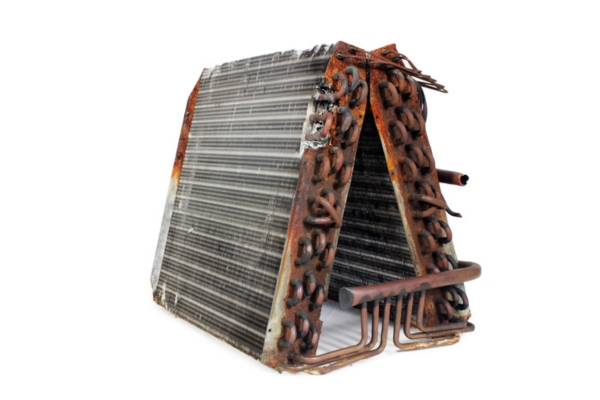
While evaporator coils are crafted from copper and aluminum to resist rust, they’re still susceptible to corrosion and pitting as time goes on. This wear can lead to tiny holes and fissures that might not be immediately visible but can greatly affect the unit’s efficiency.
Such defects permit refrigerant leaks, possibly releasing hazardous substances into the environment and reducing the air conditioner’s heat absorption capacity due to lower refrigerant levels. HVAC experts are skilled at detecting these leaks, repairing them, and refilling the system with refrigerant to regain its efficiency and safety.
Dirt Accumulation
Dust and airborne debris entering the air conditioning system can cling to the coils, creating an insulating barrier that drastically reduces heat transfer efficiency. This barrier impedes the coils’ ability to absorb and dissipate heat effectively. As a result, the system’s fans need to run longer to reach the desired temperature, causing more strain on parts and higher energy use. This inefficiency leads to elevated energy costs. Maintaining and cleaning the coils regularly is essential to avoid this problem.
AC Mold Growth
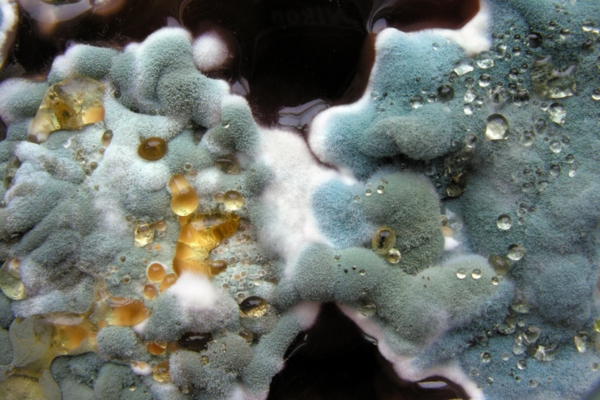
The dark, moist conditions inside indoor air conditioning units and the lack of sunlight create a perfect breeding ground for mold and mildew. These fungi can proliferate within the unit and spread through the home via the ductwork, adversely impacting the air quality in the home and posing health risks to occupants. Additionally, mold accumulation can obstruct airflow by blocking the fins of the evaporator coil, diminishing the system’s operational efficiency.
Debris Buildup on Outdoor Unit
The exterior component of an air conditioning system is prone to accumulating debris, such as dry leaves, twigs, and other outdoor waste. This accumulation can gather at the unit’s base, hindering airflow to the condenser coil and affecting the effective expulsion of heat from the refrigerant into the surroundings. A simple preventive measure is to keep the area around the unit clear of vegetation and perform regular cleanings to avoid this issue.
Issues with Air Conditioner Refrigerant
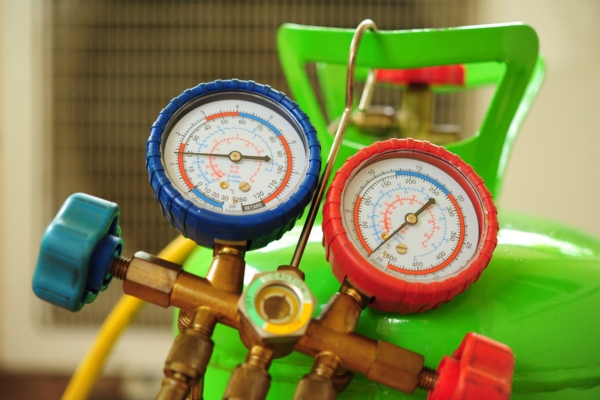
If your air conditioner’s cooling performance drops unexpectedly, it might be because of insufficient refrigerant levels. The system needs a precise amount of refrigerant to absorb and release heat in your home effectively. A reduction in refrigerant can make it difficult for the system to cool the area, possibly causing the coils to freeze and the system to shut down.
This can result in discomfort during hot weather. Should you notice signs of refrigerant issues, it’s advisable to get in touch with an HVAC technician who can diagnose and repair the problem, ensuring your system works efficiently and your home remains comfortable.
From routine maintenance to system replacements, trust Columbus Energies’ certified technicians to deliver exceptional HVAC solutions – schedule your service appointment today!
Conclusion
Air conditioning units skillfully regulate temperature by managing heat, using a refrigerant that flows through two essential elements: the evaporator coil, absorbing indoor heat, and the condenser coil, releasing it outdoors. These components cooperate to produce the cooling effect you feel.
For efficient operation, recognizing and preemptively dealing with coil-related issues is crucial. Arranging for an HVAC expert to perform yearly maintenance can avert typical problems, safeguarding the efficiency and durability of your air conditioning unit.
Contact Columbus Energies for Comprehensive HVAC Solutions
In Southeastern Massachusetts and the Rhode Island region, Columbus Energies shines as a premier provider of heating and cooling services. Our team is made up of highly trained, professionally certified technicians committed to delivering exceptional HVAC services, including maintenance, repairs, installations, and system replacements. Leveraging their vast knowledge and extensive experience, our experts ensure your HVAC system is in the best hands.
Columbus Energies prides itself on offering unparalleled value and presenting the most competitive pricing for heating and cooling services in the area. Our maintenance services are crafted to boost your comfort and energy efficiency, significantly reducing your heating and cooling costs.
Whether you need an HVAC repair or are considering a new system, our team is ready to help you find the perfect solution that meets your requirements and budget. We back our work with a full satisfaction guarantee. For a service appointment and a free in-home estimate, contact Columbus Energies today.
At Columbus Energies, we stand behind our work with a solid satisfaction guarantee. For a free, in-home estimate or to schedule your service appointment, don’t hesitate to call Columbus Energies today.
Contact us now by calling (508) 674-1492 to speak to one of our home comfort specialists!

Related Articles:
